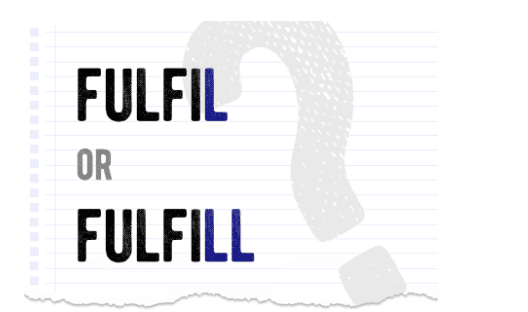Two Sides of the Same Coin: 'Fulfill' and 'Fulfil'

As English speakers in India, choosing between British and American English can be a confusing task. This decision not only affects our accent and pronunciation but also our spelling and word usage. One such example is the words “fulfil” and “fulfill.”
In British English, we spell it as "fulfil," while in American English, it's spelt "fulfill."
Understanding these slight differences can greatly improve your English language skills. It can help you communicate with different audiences and adapt your language based on the situation. So, let's get started.
Understanding 'Fulfil' and 'Fulfill'
Firstly, there are two different spellings for 'fulfill' - 'fulfil' in British English and 'fulfill' in American English. They both mean to achieve or carry out something, to meet a need or requirement, or to satisfy a condition. Let's look at some examples
British English (Fulfil)
I need to fulfil my duty
We must fulfil our promise
American English (Fulfill)
I need to fulfill my duty.
We must fulfill our promise.
Now, you might be wondering about the general differences between British and American spelling rules. Here are a few bullet points to help you understand:
Words ending in ‘-our’ in British English (e.g., colour), often end in ‘-or’ in American English (e.g., color).
Words ending in ‘-etre’ in British English (e.g., theatre), usually end in ‘-eter’ in American English (e.g., theater).
Sometimes, words with a single ‘l’ before vowels like ‘l’ or ‘p’ are doubled in British English but not in American English. Example: travelling vs traveling.
For more words that have different spellings across these language variants, check out Clapingo blogs like Canceled or Cancelled and Favourite Vs Favorite.
Why Do These Differences Occur?
The spelling variations between 'fulfil' and 'fulfill' are due to historical differences in English language usage between the United Kingdom and the United States.
During the late 18th and early 19th centuries, American English began to differ from British English, adopting simplified spellings for certain words. This linguistic shift was led by prominent figures such as Noah Webster, who wanted to create a unique American linguistic identity.
Two similar examples to 'fulfil vs fulfill' are 'colour vs color' and 'centre vs center'. In both these cases, the British version retains the original form, while the American variant opts for a simplified spelling.
Want to learn more about the journey of language evolution?
Common Mistakes with 'Fulfil' and 'Fulfill'

Mistakes often crop up when learners grapple with 'fulfil' and 'fulfill'. Here are some common errors along with their corrections.
Mistake 1: Using the wrong spelling in the wrong context. For example, "I have fulfiled my duties" would be incorrect in Indian English usage as it follows British spellings. The corrected sentence would be, "I have fulfilled my duties."
Mistake 2: Incorrectly conjugating these verbs. Both 'fulfil' and 'fulfill' follow regular verb conjugation rules. An incorrect usage might be "I fulfill my promise". The correct form should be, "I fulfilled my promise."
Choosing Between 'Fulfill' & 'Fulfil': What Should Indian Learners Do?
Feeling confused about whether to use 'fulfil' or 'fulfill'? Many English learners in India face this confusion, especially when they have to write in different contexts such as academic, professional, or casual environments.
In British English, which is typically followed in India, we use 'fulfil'. So if you're writing an academic essay or a formal email in your workplace, use 'fulfil'.
On the other hand, if you're chatting with your American friend on social media or writing for an international audience who may be more used to American English, use 'fulfill'.
Remember, both spellings mean the same thing - to complete or carry out something.
So next time you face this doubt, ask yourself: Who am I speaking with? Where are they from? And what version of English do they use? Your answers will guide your choice between 'fulfil' and 'fulfill'.
Powering Up Your English Skills with Clapingo
Clapingo offers personalized coaching to improve vocabulary, pronunciation, and fluency for individuals dealing with complex language issues like "fulfil vs fulfill".
With our custom sessions and flexible plans, you'll soon navigate through the English language with ease, improving your communication skills for professional growth.
A Quick Recap
In our journey to master English, we have solved the confusion between 'fulfil' and 'fulfill'.
To recap, British English prefers 'fulfil', while American English leans towards 'fulfill'. Both words carry the same meaning - to carry out or achieve an action, duty, or role as required or promised.
Remember, in professional communication, consistency is key. If you're using British English spellings in your document, use 'fulfil' in all the places. The same rule applies for American English and 'fulfill'.
For more detailed learning and understanding confusing words like 'fulfil' and 'fulfill', try Clapingo. Their personalized coaching sessions are tailored to meet individual language requirements. Keep exploring and evolving with Clapingo - Book a quick demo here.
Frequently Asked Questions
1. Why do British people use ‘fulfil’ while Americans use ‘fulfill’?
The difference in spelling is due to the differences between British and American English. The British version uses a single 'l', while the American version uses double 'l'. This variation is seen in several other words too, such as 'travelled' (UK) vs 'traveled' (US), or 'labelled' (UK) vs 'labeled' (US).
2. Am I wrong if I use ‘fulfill’ instead of ‘fulfil’ in India?
No, you're not wrong. Both spellings are correct and understandable to English speakers worldwide. However, in India, we usually follow British English, including spelling and pronunciation rules. Thus, using 'fulfil' might be more appropriate for formal or academic contexts.
3. Does using ‘fulfil’ or ‘fulfill’ affect my spoken English?
Not greatly! Since both words have the same pronunciation, the spelling doesn't impact your spoken English directly. However, knowing these differences can improve your overall understanding of the language.
Comments
Your comment has been submitted